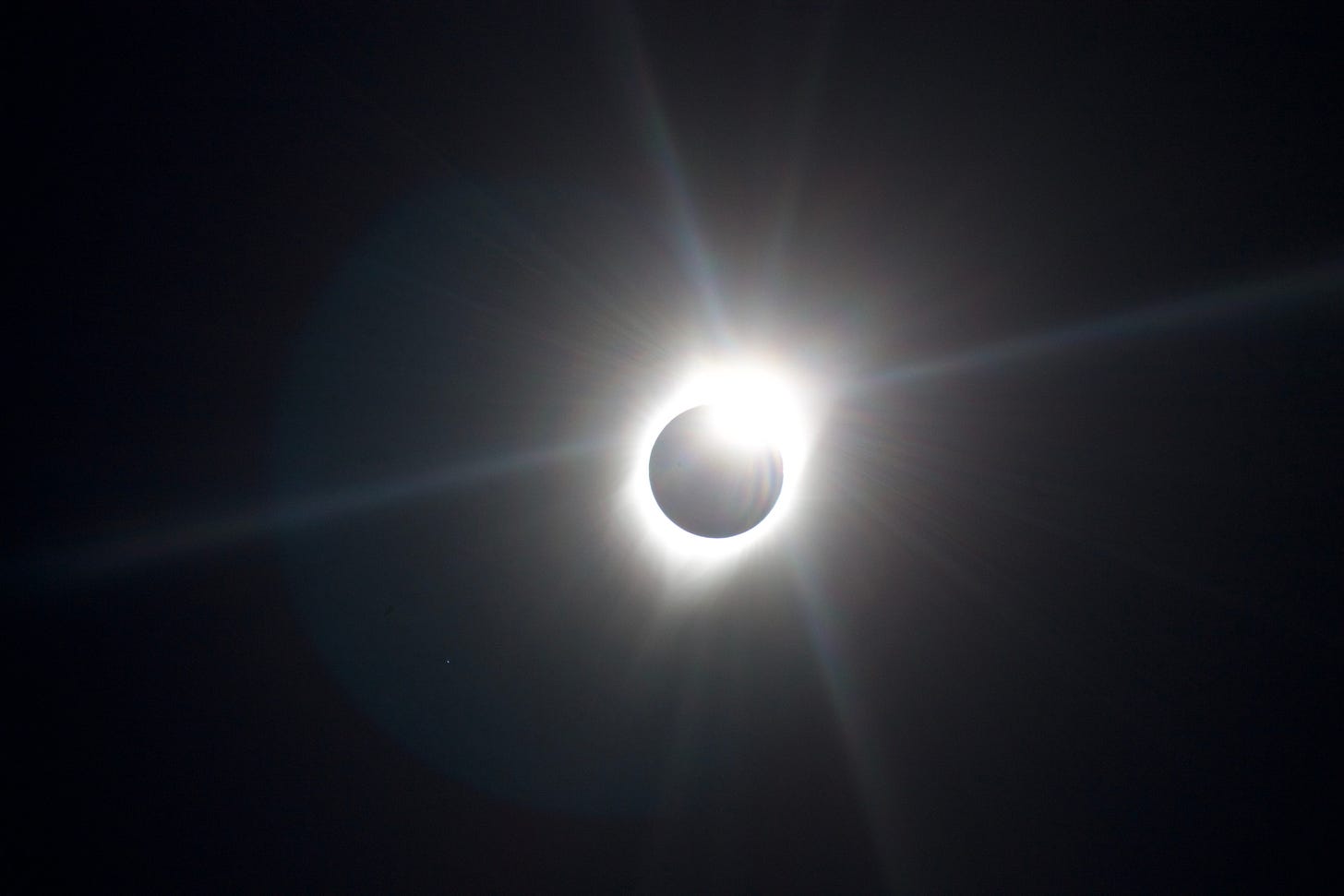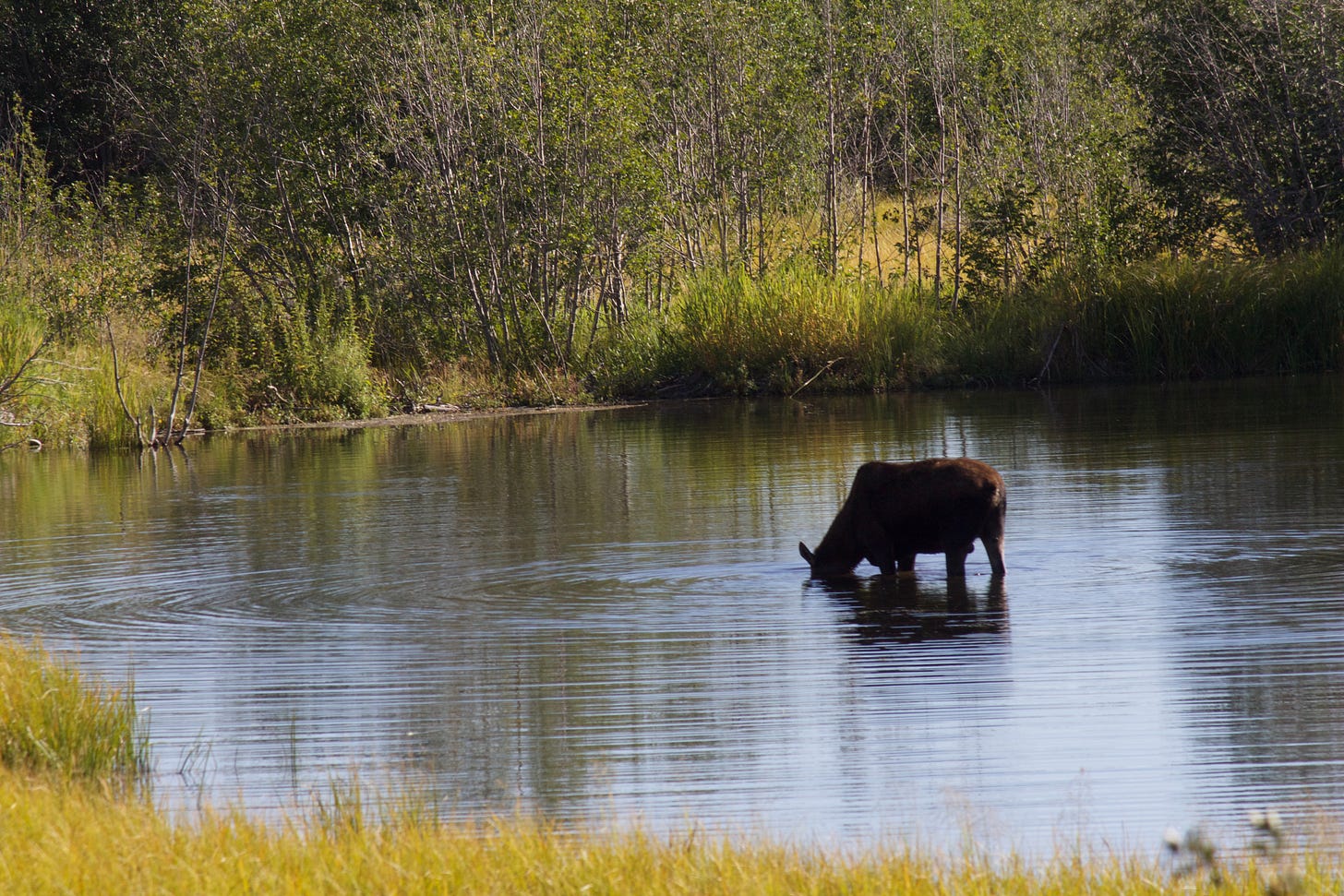Always in the Dark
I had a transformative eclipse experience in 2017 and I'm still resentful about it
Did you have a wonderful, transformative eclipse experience yesterday? I hope so! I didn’t, because I don’t live in the path of totality. And because I specifically avoided it, because my last total solar eclipse in 2017 was… a little too transformative for me, honestly, and while I’m grateful for the transformations in my life since then it seemed safer to just stay inside and not look up.
My ex and I started planning for the 2017 eclipse years in advance. Initially, our concept was that we’d go camping somewhere, but my parents thought it sounded cool and offered to take us to Jackson Hole for several days to see national parks. It was an amazing trip. Much later I learned that during that trip — not literally during the eclipse, but almost — my ex’s egg hatched and she realized she was trans. But as we departed for Wyoming we still thought of ourselves as a hetero couple.
My ex prepared for the eclipse by packing special camera equipment, and I prepared by reading essays: Maria Mitchell, Virginia Woolf. My favorite was Annie Dillard’s iconic 1982 essay “Total Eclipse” (published a year before the arguably even more iconic Bonnie Tyler song “Total Eclipse of the Heart”). She describes the beginning of the eclipse: “I turned back to the sun. It was going. The sun was going, and the world was wrong. The grasses were wrong; they were platinum. Their every detail of stem, head, and blade shone lightless and artificially distinct as an art photographer’s platinum print. This color has never been seen on Earth.”
I hoped reading Dillard would show why people seemed to want eclipses to mean something. It wasn’t enough for them to be a visually interesting astronomical occurrence. I had no intention of being an emo killjoy who was too cool for the eclipse, but I thought I was immune to that way of looking at the sky. Two years earlier, in late 2015, I’d gotten a small blue circle tattooed on my wrist – a reference to Carl Sagan’s Pale Blue Dot, his reflection on a picture of Earth, a tiny blue speck of light, taken by Voyager I in 1990. Sagan muses that all of human history has taken place “on a mote of dust suspended in a sunbeam.” When I was struggling with balancing taking care of a challenging toddler and reading misogynist vitriol online, I would rub the inside of my wrist and remember that this was an infinitesimal blip in the scheme of things.
As someone who had turned being pragmatic about outer space into a permanent part of my flesh, I didn’t expect to feel like the eclipse was more than just a pretty cool experience. As I looked at all of the “Solar Eclipse 2017” memorabilia being sold throughout Jackson Hole, I was mostly amazed by the capitalist cynicism of it all.
Two of my three Eidolon co-editors were very into astrology, and they convinced me to officially relaunch the publication as an independent feminist journal on August 21, the day of the eclipse. One of them pointed out that the ancient Greeks thought that part of the reason why eclipses are so unsettling is that the female energy of the moon dominates the male energy of the sun, temporarily upsetting the (allegedly) natural order of the universe. (This turned out to be really viscerally true to my life in ways NONE of us could have foreseen!) Relaunching during an eclipse, she argued, would be the perfect way to underscore our all-female editorial team’s independence from the nonprofit we’d left behind, which was now run solely by the man who told me feminism was anti-white like that was a bad thing and the man who attempted to extort me for millions of dollars.
The ancient Greeks took eclipses very seriously. Herodotus tells the story of the philosopher Thales of Miletus, who accurately predicted an eclipse in May 585. The Medes and the Lydians were in the middle of fighting a battle, and when it suddenly grew dark in the middle of the day, they were so shocked and alarmed that they called a cease-fire. The Antikythera Mechanism – a complex device more than two thousand years old discovered in a shipwreck in 1900, sometimes called “the first computer” – is thought to have been used to calculate when eclipses would occur. It makes sense. Imagine that you knew an eclipse was going to happen, and in the middle of battle a chill fell and you raised your sword and shouted, “LO, I BRING THE DARKNESS!” just as the moon covered the sun. What enemy wouldn’t retreat? That would be an incredible tactical advantage.
I understand wanting things to mean something. If I didn’t, I wouldn’t have written a goddamn memoir. Even when you know it’s just celestial bodies that don’t care about you moving through space, you want it to have some deeper message about not seeing that which you should be able to see. Or something.
The day of the eclipse, we rode a gondola to the top of the ski mountain, which ended up being my four-year-old’s favorite part of the entire trip. Every few minutes for the next hour she asked to ride the gondola again. At the top, there was a catered party with passed hors d’oeuvres, solar system-themed activities for kids, gift bags with glasses safe for looking at the eclipse, and an extremely on-the-nose playlist with songs like “Black Hole Sun” and “Walking on Sunshine.” I tried to engage my ex in dunking on it all, but she was too busy fretting that it might get cloudy. “If it’s overcast, we won’t be able to see the sun and the eclipse,” she said, refreshing the weather forecast for the dozenth time that hour. “And this whole trip will have been for nothing.”
“I mean, not nothing,” I said. “Remember all those national parks we went to? We saw a moose!”
“It was a female moose! It didn’t even have antlers.”
It was warm on top of the mountain, until the eclipse began and the temperature began to drop. They stopped the music, and everyone watched in silence, looking at the sun through our protective glasses. I held my kid’s too-large glasses on her face to keep them from falling off.
The air gradually got cooler and dimmer, until suddenly a shadow raced across the valley. I felt goosebumps form on my bare arms, from the chill and the eeriness of the daytime darkness. And then we could look up without our glasses at the perfect corona, a crown of light shimmering around the moon. The moment eclipse began, “Here Comes the Sun” came on the on-the-nose playlist, and I wasn’t even bothered by how cheesy (or technically incorrect) it was.
It felt like something profound had happened. And I felt silly for how cliché that feeling was. I’d assumed it would be more meaningful for my ex than for me, but I was surprised by how moved I was. If she had said, “Donna, I’m a woman now,” I’d have been like, “Yeah, of course. I get it.”
When the moon shifted and we couldn’t look directly at the eclipse anymore, my ex put the camera away. “That was really something, right?”
“It was beyond,” I said.
She smiled at my wide-eyed expression. “The next total solar eclipse is going to be in 2019,” she said. “You can see it from Argentina.”
When my mother planned the Jackson Hole trip, she had told my ex that it was her holiday and birthday presents for the next five years. But the eclipse must have moved her too, because she immediately said, “We’ll be there. The wine and steaks are great.”
We made our way back to the gondola. My kid was so excited that she was hopping up and down. As we descended the mountain, my ex and parents began planning a trip to South America that would never happen. We would be too busy getting divorced and learning how to handle the next chapter of our lives.
I just want to tell you that, if you saw the eclipse yesterday and it made you feel a way, that isn’t silly and you’re not alone. As someone deeply dedicated to being sarcastically analytically detached from everything as possible and shielding my gooey soft sweet marshmallow heart, I get it. But it’s ok. You’re not alone.






